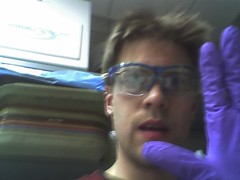Just raise my hopes again, why don't you?
All of your friends who make fun of people who get cryonically frozen might be wrong again:
The latest research on water - still one of the least understood of all liquids despite a century of intensive study – seems to support the possibility that cells, tissues and even the entire human body could be cyropreserved without formation of damaging ice crystals, according to University of Helsinki researcher Anatoli Bogdan, Ph.D...
...Bogdan's experiments involved a form of water termed "glassy water," or low-density amorphous ice (LDA), which is produced by slowly supercooling diluted aqueous droplets. LDA melts into highly viscous water (HVW). Bogdan reports that HVW is not a new form of water, as some scientists believed.
"That HVW is not a new form of water (i.e., normal and glassy water are thermodynamically connected) may have some interesting practical implications in cryobiology, medicine, and cryonics." Bogdan said.
"It may seem fantastic, but the fact that in aqueous solution, [the] water component can be slowly supercooled to the glassy state and warmed back without the crystallization implies that, in principle, if the suitable cyroprotectant is created, cells in plants and living matter could withstand a large supercooling and survive," Bogdan explained. In present cyropreservation, the cells being preserved are often damaged due to freezing of water either on cooling or subsequent warming to room temperature.
This is beyond my area of expertise, so I'll just label this "sounds promising" for now. However I will point out that one should not argue with a Finn when it comes to ice. Unless one is an approaching Soviet army... and even then, it's probably not that great an idea.


1 Comments:
I don't know the physics behind the supercooled water stuff, but cryoprotectants do exist...glycerol or glucose flood into the systems of freeze-tolerant frogs, and trehalose seems to be an important protectant in dessication-tolerant plants (dessication and freeze tolerance seem to be evolutionarily linked, since both involve the loss of "biologically functional" water). The main issue would be whether human tissues can handle cryoprotectants.
Post a Comment
Send Haloscan trackback ping
<< Home